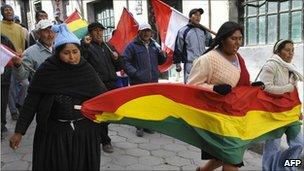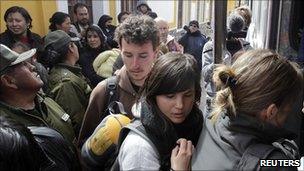Bolivia protesters demand talks with Evo Morales
- Published

Potosi and the surrounding region have seen protests since the end of July
Attempts to end more than two weeks of strikes and blockades that have disrupted mining and daily life in south-west Bolivia have so far failed.
Protest leaders, who want more government investment in the Potosi region, and government ministers had gathered for potential talks.
But protesters said they would only talk if President Evo Morales attended.
A government spokesman rejected this, saying protests must end before dialogue begins.
On Thursday, the protest leaders and government ministers had travelled to the constitutional capital of Sucre to try to work out a way of beginning real dialogue.
However, representatives from the Potosi Civic Committee (Comcipo) insisted that President Morales meet them personally.
"We'll wait here until the president comes to begin the dialogue," said Comcipo leader Celestino Condori.

Foreign tourists have been trying to get out in bus convoys
Bolivia's Minister of Autonomy Celso Romero said he and his colleagues would also wait in Sucre in the hope that the protesters would see sense and "think of their people and their country".
President Morales said the protests were politically motivated.
Among their demands, demonstrators want the settlement of a boundary dispute with the neighbouring department of Oruro.
They also want more government spending to expand the local airport and build new roads.
Government officials say Potosi is among the regions that have benefited most from state investment.
Travel advice
With roads blocked, food supplies have been running very low.
Dozens of foreign tourists remain trapped in the area, including Spaniards, Argentines, British nationals, Danes and South Koreans.
The US has advised its citizens not to travel to Potosi, Uyuni or Oruro. The British Foreign Office has issued similar advice.
The protests have also disrupted the key mining industry.
US-based Coeur d'Alene has shut its San Bartolome mine, the world's biggest pure silver mine, while Japan's Sumitomo has stopped processing ore at its San Cristobal silver, zinc and lead mine.